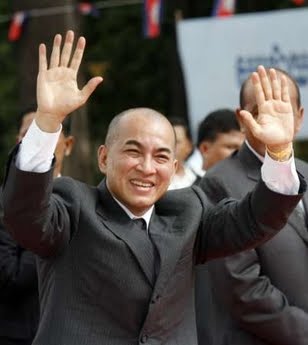Cambodia’s King Seen as a ‘Prisoner’ in His Palace
King Norodom Sihamoni may be heir to a royal line trailing back some 2,000 years, but he always seemed more suited to the arts scene in Europe, where he was a ballet dancer, than the rough and tumble politics of his homeland. Now, close aides and experts say, he has become figuratively, and more, a prisoner in his own palace. The chief warden: Prime Minister Hun Sen, who rose from a poor rural background to become a brilliant and crafty, some say ruthless, politician. Hun Sen consolidated power in a 1997 coup as Cambodia slowly emerged from being dragged into the Vietnam War and its own civil war. While the country is nominally democratic, he uses all the machinery of government to lock up critics and ensure his re-election. Human rights groups allege that he and his business friends are enriching themselves, while most of the population remains mired in poverty. His control extends over the palace. The king is surrounded by the government’s watchdogs, overseen by Minister of Royal Affairs Kong Som Ol, an official close to Hun Sen. Sihamoni is closely chaperoned on his few trips outside palace walls, with the media kept away. Although the constitution endows him with considerable powers, these have never been granted. “I think we can use the words ‘puppet king.’ His power has been reduced to nothing,” says Son Chhay, an opposition member of Parliament and one of the government’s few outspoken critics. “The king must please the prime minister as much as possible in order to survive. It is sad to see.”
Sihanouk abruptly abdicated in 2004 following confrontations with Hun Sen. Son Chhay and others say Sihamoni accepted the crown under pressure from parents hoping to ensure the survival of the monarchy. Cambodia’s King Seen as a ‘Prisoner’ in His King Norodom Sihamoni may be heir to a royal line trailing back some 2,000 years, but he always seemed more suited to the arts scene in Europe, where he was a ballet dancer, than the rough and tumble politics of his homeland. Now, close aides and experts say, he has become figuratively, and more, a prisoner in his own palace. Hun Sen consolidated power in a 1997 coup as Cambodia slowly emerged from being dragged into the Vietnam War and its own civil war. While the country is nominally democratic, he uses all the machinery of government to lock up critics and ensure his re-election. Human rights groups allege that he and his business friends are enriching themselves, while most of the population remains mired in poverty.
Seven years later, “sad, lonely, abandoned” are words sympathetic Cambodians often use when describing Sihamoni. The 58-year-old monarch spends much of each day signing documents, receiving guests and handling other routine business, then retires mostly to dine alone and read, says Prince Sisowath Thomico, Sihanouk’s private secretary and an adviser to his son. Unlike his father, who had six wives and numerous lovers, Sihamoni is a lifelong bachelor and unlikely to leave an heir. His birthday passed recently with little notice. Within the palace’s crenelated walls, among the graceful pavilions and gilt spires, there was no sign of activity. Outside, knots of people went about their normal evening pastimes at the grassy, riverfront square, feeding pigeons, lounging on reed mats and snacking on lotus seeds and noodles. “The king is a good, gentle man, a symbol of Cambodia. But he has one problem: no power. He only stays inside the palace. On television the leaders bow down before him but behind his back there is no respect,” said Sin Chhay, a young civil servant at the plaza. “You could say that Hun Sen is the real king of Cambodia.” Information Minister Khieu Kanharith insists the king is involved in social and religious affairs and judicial reviews, receives a monthly report from Hun Sen on government activities and makes recommendations on them.
“The current King Sihamoni has played an important role in restoring the … monarchy. As a king and symbol of national unity he maintains strict neutrality and doesn’t become involved in any political activities,” he said. “To say that he’s a prisoner in the palace would be inappropriate.” He returns regularly to what is now the Czech Republic, calling it “my second homeland,” and has said his time in Prague “belongs to the happiest in my life.” Fluent in the language — which reportedly vexes his keepers trying to eavesdrop on conversations with Czech visitors — he avidly reads Czech theater reviews and savors DVDs of ballets and operas. He keeps in close touch with the family that cared for him after he arrived in the Czech capital at age 9. Thirteen years later, he graduated from Prague’s Academy of Musical Art.

